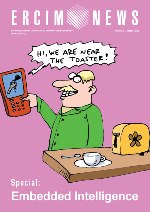by Eberhard Mueller and Ulrich Hofman
A research project funded by the FIT-IT programme of the Austrian ministry for traffic, innovation and technology (BMVIT) investigates the potential of different energy sources for communication purposes, especially for out-door activities.
The economic relevance of this research activity can easily be seen by examining the efforts companies take to optimise the energy consumption of embedded devices. The use of alternative energy supply, like Piezo-Elements or Thermo-Elements, will thus be a great chance to achieve this goal so as to minimise costs and to make devices independent from external energy supply.
Energy management is not only considered in terms of minimising the energy consumption, but also as finding additional ways for energy to be supplied. Furthermore, the energy-consuming activities are bound to the current status of energy production and the current cost functions. For example, energy consuming communication tasks are carried out not continuously, but at optimal opportunities by episodic transmission protocols. This principle is verified using two very different application scenarios: skis and bicycles.
The scientific aim of the project is to develop an innovative integrated framework and tool for modelling the energy and communication processes in networked embedded systems. Todays modelling approaches and tools are based on a combination of discreet modelling of the communication processes and an underlying model describing the energy consumption. The modelling and simulation of the energy processes in sinks (sensors, actuators, physical communication) and sources (generator, battery) are realised by means of continuous models.
This two-paradigm approach has its disadvantages:
-
Handling two modelling approaches and isolated tools is difficult for the researchers/engineers and increases the duration of the development cycle.
-
Interfaces between different modelling approaches/tools have a potential for misinterpretation by the experts in their respective domain.
To overcome these drawbacks we model the data communication process by following a new approach that we have investigated in the European IST project INTERMON. There, data traffic is modelled as a continuous (in time and value), fluid process. We bring this paradigm into the modelling domain of networked embedded systems. Using the fluid abstraction, which was successfully employed in large scale IP networks, will open the way to a unified continuous modelling framework. This framework will accommodate the energy and communication models that will be developed within the project. In a second stage, the models will be validated and integrated into a complex system. As a proof of concept this new integrated modelling approach will be employed for the design and the development of a prototype.
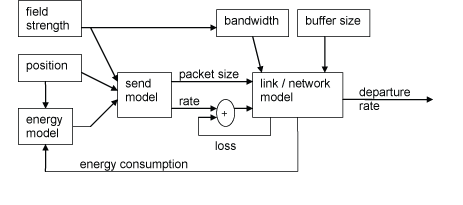
The main challenge is to optimise data communication, sensor data generation and storage of relevant data in the prototype. This includes an autonomous power supply which makes use of the forces, temperatures or other physical phenomena that occur during the use of such devices. State-of-the-art sensor technologies, power sources and communication systems will be investigated and their process models will be derived, measured and integrated into the continuous unified modelling framework. Measurement data of field trials will be used for the validation of the scientific and technical approaches.
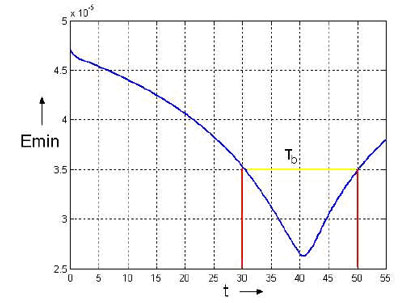
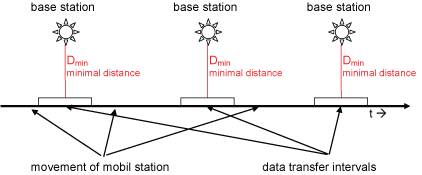
Figure 1 shows the logical components and models which are developed. The send model includes continuous and episodic transmission protocols above the Layer-2 WLAN-protocol (Figure 2). Figure 3 shows transfer intervals of a mobile station to different base stations.
Links:
Salzburg Research: http://www.salzburgresearch.at/company/
ESYCS - Embedded Systems Cluster Salzburg: http://esycs.salzburgresearch.at/
INTERMON: Advanced architecture for INTER-domain quality of service MONitoring, modelling and visualisation: http://www.ist-intermon.org/
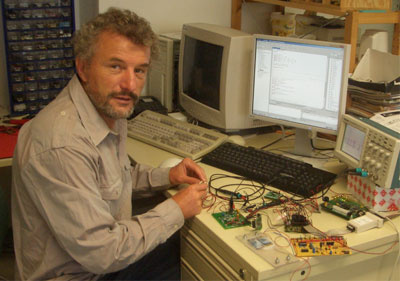
Please contact:
Eberhard Mueller and Ulrich Hofmann Salzburg Research GmbH, Austria
Tel: +43 662 2288 445
E-mail: emueller![]() salzburgresearch.at,
salzburgresearch.at,
ulrich.hofmann![]() salzburgresearch.at
salzburgresearch.at
